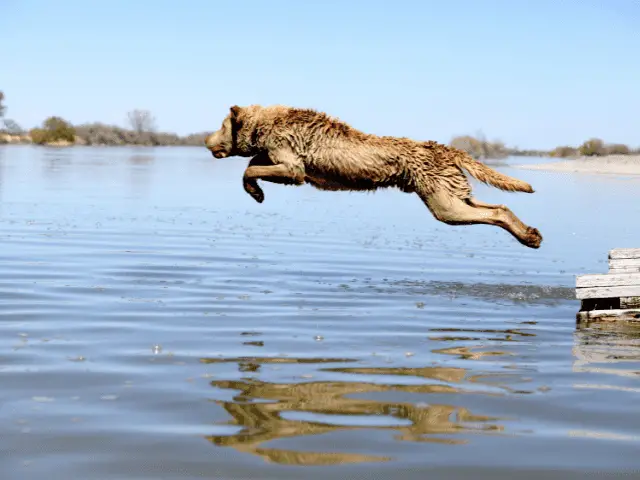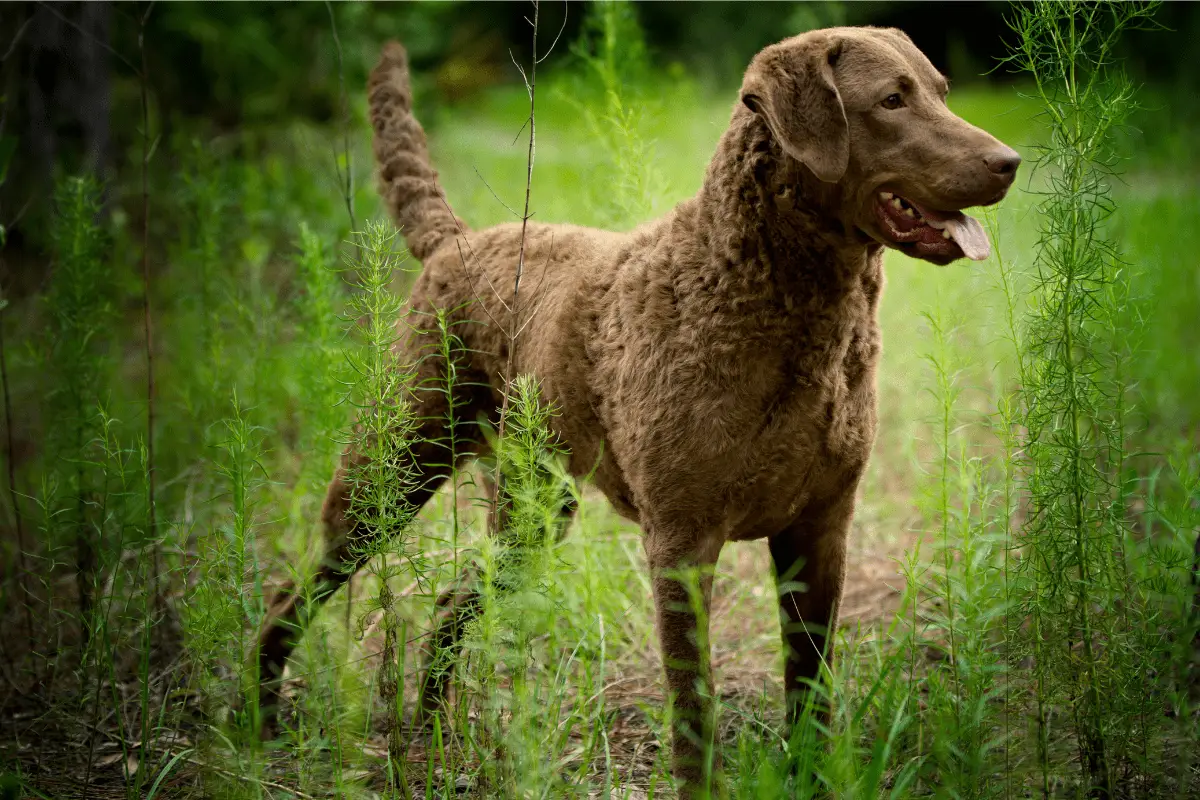Spending time outdoors has been proven to improve mental health and overall wellbeing and adding a canine companion to your travels is a great way to make hiking even more fun.
Just like people, dogs enjoy a variety of different activities and for hikers considering bringing a canine companion along for the adventure, it’s important to understand the breed and the best conditions for each individual dog.
Chesapeake Bay Retrievers, sometimes referred to as Chessies, are the perfect trail companion for hikers that enjoy incorporating water activities into their hikes due to their strong swimming skills, loyalty to their owners, and high intelligence. Understanding the breed, their health considerations, and what types of activities they excel at will create an ideal lifelong hiking buddy.
This article contains affiliate links. If you make a purchase through one I may receive a commission.
Health Considerations for Chesapeake Bay Retrievers

Although Chesapeake Bay Retrievers are a relatively healthy breed with an average lifespan of 10 to 13 years, they may be prone to a few inherited conditions that may make hiking more challenging or impossible if undiagnosed or left untreated.
are a relatively healthy breed with an average lifespan of 10 to 13 years, they may be prone to a few inherited conditions that may make hiking more challenging or impossible if undiagnosed or left untreated.
Like all dogs, Chessies should receive annual veterinary visits to ensure they’re up to date on vaccinations and healthy enough for physical activity.
Bone & Joint Diseases
Chesapeake Bay Retrievers are prone to developing bone and joint issues known as elbow or hip dysplasia . In affected dogs, irregular growth of the ball and socket joint causes the femur and the adjoining socket of the pelvis grow at disproportionate rates, resulting in laxity of the joint leading to degenerative joint disease or osteoarthritis
. In affected dogs, irregular growth of the ball and socket joint causes the femur and the adjoining socket of the pelvis grow at disproportionate rates, resulting in laxity of the joint leading to degenerative joint disease or osteoarthritis .
.
While appropriate breeding habits and health testing can rule out this condition in some dogs, it’s important to have a thorough veterinary exam before starting hiking and to stop if your dog displays any symptoms of pain during hiking such as limping, lethargy, or being slow or unable to rise after periods of activity.
For Chessie puppy owners, feeding a balanced diet for each stage of life, adding joint support supplements, and avoiding strenuous exercise during adolescence can further decrease the odds of elbow or hip dysplasia later in life.
Hypothyroidism
Although not generally a life threatening medical condition, Chesapeake Bay Retrievers are disproportionately affected by an immune-mediated condition known as hypothyroidism . Dogs affected by this condition will typically suffer from increased weight gain, hair loss, and lethargy or exercise intolerance which can impact their active lifestyle when it comes to hiking.
. Dogs affected by this condition will typically suffer from increased weight gain, hair loss, and lethargy or exercise intolerance which can impact their active lifestyle when it comes to hiking.
Although there is no cure for hypothyroidism, symptoms can be managed with prescription medications along with diet and lifestyle changes. Owners of Chessies diagnosed with this condition should consult with their veterinarian to discuss any physical limitations due to the condition and ensure it is safe for their pup to continue or resume hiking.
Chessies Enjoy Physical Activity and Playtime

This highly active breed requires a moderate to high amount of physical activity each day with at least 1 hour per day set aside for playtime.
Chessies are a strong breed with a muscular build that possess high stamina and unyielding endurance, making them ideal hiking buddies for endurance hikers or long distance trekkers.
However, their somewhat cumbersome body type is not well suited for activities requiring a great deal of agility like trail running.
When hiking long distances, it’s important for owners to be prepared with plenty of supplies for their pup like adequate amounts of water, travel bowls , a collar with easy to read identification tags, a leash and harness, and training aids.
, a collar with easy to read identification tags, a leash and harness, and training aids.
In addition to hiking, Chessies also enjoy a variety of other physical activities like playing fetch or frisbee, tug of war, dock diving, and swimming that can be easily incorporated into a hike.
Chesapeake Bay Retrievers Excel at Swimming
For hikers that enjoy incorporating water activities into their hikes, this breed makes the ultimate companion due to their natural affinity for water and strong swimming skills. Originally bred for duck hunting, Chessie’s are no stranger to water and will immediately take to swimming as one of their favorite pastimes.
Even though Chesapeake Bay Retrievers are generally natural born swimmers, owners should practice appropriate water safety habits like introducing pets to swimming at an early age, providing direct supervision when swimming, teaching water safety commands, and investing in canine life jackets or other water safety tools.
like introducing pets to swimming at an early age, providing direct supervision when swimming, teaching water safety commands, and investing in canine life jackets or other water safety tools.
Additionally, owners should ensure their dogs have plenty of fresh water available to avoid the potential of drinking saltwater or water from contaminated lakes or rivers.
Chesapeake Bay Retrievers Do Well Off Leash (Under Certain Circumstances)
Although each dog is different, most Chesapeake Bay Retrievers require the training skills of experienced dog owners before they can be trusted to hike off leash.
Their unwavering loyalty to their owner will instinctively keep them close on hikes, but their watchdog tendencies and reservations about meeting strangers may become an issue when passing other hikers or dogs on the trail. Chesapeake Bay Retrievers are often headstrong and not the ideal companion for novice dog owners.
Before making the decision to hike with an off leash dog, owners should consider their pet’s personality and training level, trail rules and guidelines, and hiking conditions including daylight time, weather, and familiarity with their surroundings.
It is not recommended for puppies, newly adopted dogs, dogs with medical conditions, or untrained pets to be off leash unsupervised but hiking is the perfect time for owners to work on socialization and training techniques in a controlled environment.
Cold Weather is No Match for a Chessie

Chesapeake Bay Retrievers are easily recognizable by their distinctive curly hair coat, but their fur is for more than just looks. Chesapeake Bay Retrievers make ideal hiking companions for cold weather hiking due to their double coat , which consists of a fine, wooly undercoat with a thicker, wavy outer coat that provides important temperature regulation in all types of weather.
, which consists of a fine, wooly undercoat with a thicker, wavy outer coat that provides important temperature regulation in all types of weather.
Additionally, this sporting breed produces natural oils that act as a water-resistant protective barrier to keep them warm when swimming in cold water.
In the winter, the undercoat serves as natural insulation to keep pets warm, but in cases of more severe weather, owners should practice cold weather animal safety techniques. When hiking in cold weather, it’s important to stay away from icy terrain, invest in canine hiking gear like snow boots and properly fitted winter coats , and ensure your dog is healthy before setting off on an adventure.
, and ensure your dog is healthy before setting off on an adventure.
When on the trail, owners should monitor their Chesapeake Bay Retriever for signs of hypothermia and be prepared for emergency situations with supplies like extra water, dry blankets, medications, and emergency contacts.
and be prepared for emergency situations with supplies like extra water, dry blankets, medications, and emergency contacts.
Camping with Chesapeake Bay Retrievers
Chesapeake Bay Retrievers can make excellent companions for hikers setting out on multi-day excursions or camping retreats. Due to their high adaptability and awareness of their surroundings, Chessies have a fairly easy time adjusting to new situations and make great alert dogs to keep themselves and their owners safe if any wildlife or unwanted intruders approach the campsite.
However, Chessies are generally wary of strangers and prefer spending time with their owner rather than in the company of other dogs. Poorly or undersocialized Retrievers can pose a threat to other hikers and their dogs approaching on the trail or at the campsite.
Owners should spend time on proper socialization techniques at a young age to ensure their Chesapeake Bay Retriever is well adjusted and adaptable to a change in surroundings.
at a young age to ensure their Chesapeake Bay Retriever is well adjusted and adaptable to a change in surroundings.
High Elevation Hiking with Chessie
Like all humans and other mammals, dogs can be prone to altitude sickness at elevations greater than 8,000 feet, and attempting a high elevation hike with your Chesapeake Bay Retriever before they are properly trained and acclimated may result in a serious, life threatening medical condition.
at elevations greater than 8,000 feet, and attempting a high elevation hike with your Chesapeake Bay Retriever before they are properly trained and acclimated may result in a serious, life threatening medical condition.
Elevation hikers should consult with their veterinarian before attempting high elevation hikes with their Chesapeake Bay Retriever and ensure they know the risks of high altitude hiking for themselves and their pets before hitting the trail.
for themselves and their pets before hitting the trail.
Symptoms of altitude sickness in pets include labored breathing, nausea/vomiting, excessive panting, pale gums, increased heart rate, and collapse. Chessie owners should always bring plenty of water for their pets when hiking high elevations as higher altitudes can quickly cause pets to become dehydrated.
Chesapeake Bay Retrievers are highly intelligent, serious working dogs that excel when given a task and are not for novice dog owners. With proper training techniques, Chessies can make an ideal trail partner for solo hikers that enjoy an active lifestyle and long hikes.
These Retrievers are athletic, determined dogs that can keep their owners safe and happy while building memories on the trail that will last a lifetime.
Have More Dogs in Your Pack?
Zenful Hiking has dozens of breed-specific hiking guides for all kinds of different breeds from Bernese Mountain Dogs to Chihuahuas. These guides can help ensure your hikes with your four legged hiking partners are safe and fun!

